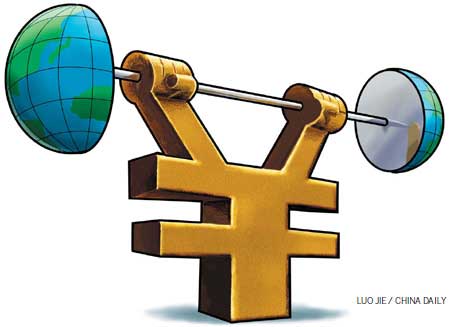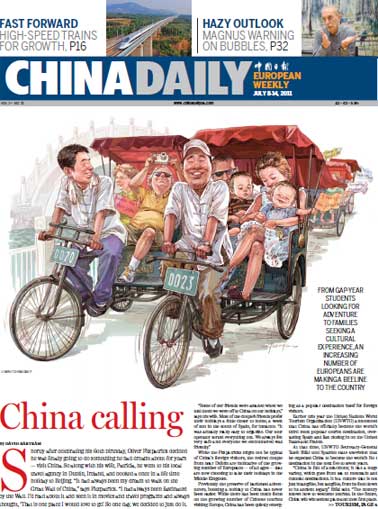Yuan influence should cross borders
Updated: 2011-07-08 11:07
By Zhang Ming (China Daily European Weekly)
Currency internationalization will help China reduce reliance on risky US debt
|
 |
The Chinese government has fastened the speed of promoting the yuan as a global settlement currency, alongside the dollar and the euro, especially after the financial crisis in 2008.
An international currency is used and held beyond the issuing country's borders, and plays the role of unit of account, medium of exchange, and store of value for residents and non-residents alike.
The Chinese government has taken several strategic steps to promote the yuan as an international currency. It started with promoting the yuan to be used in cross-border banking transactions, as a settlement currency for China's overseas direct investment and finally as an international reserve currency.
Total cross-border yuan settlement in the first half of last year hit 67 billion yuan (7 billion euros) and this figure went up to 467.8 billion yuan after the central bank expanded a pilot project allowing Chinese and foreign companies to settle trade transactions in yuan.
Thus far, China has made significant progress in the use of the yuan as a settlement currency, in the issuance of yuan-denominated bonds, and in signing currency-swap agreements with foreign central banks. Yuan deposits in Hong Kong are also growing exponentially.
The question is what are the strategic concerns of the Chinese government on its efforts to promote yuan internationalization? Certainly, there are many potential benefits for China from an internationalization of the yuan.
The outbreak of the US sub-prime mortgage crisis is the external factor that pushed the Chinese government to accelerate the internationalization of the yuan. Before the outbreak of the sub-prime crisis, the US dollar was considered a stable international reserve currency, and its national debt the most liquid-riskless asset.
The Chinese government has accumulated a lot of foreign exchange reserves through trade and foreign capital inflows. This shows that the Chinese government had a belief in US dollars and US treasuries. However, the sub-prime crisis has undermined the US dollar's and US treasuries' reputation for reliability.
The second quantitative easing measure has contributed to the depreciation of the dollar, and the continuation and deepening of the credit crisis in the US. Such a move entirely encroaches on the interests of the creditors, indicating the decline of the US government's intentions to repay its debt.
The US government has injected $2.8 trillion into the economy since 2008. Serious defects in the US economic development and management model have led to the long-term recession of its national economy, fundamentally lowering national solvency.
For the first time, credit ratings agency Standard & Poor's cut its outlook on US debt from "stable" to "negative" in April this year. A negative outlook means there is 33 percent chance that it will be downgraded again in the next two years.
In March, investment firm Pimco cut its holdings of US government-related paper to zero for the first time in the history of the firm.
As the biggest overseas creditor of the US government, the Chinese government's holdings of US treasuries are facing the risk of inflation, drop in value and low yields. The major question for the Chinese government is that if it continues to accumulate foreign exchange reserves, the risk will rise and if it didn't do this, it is hard for China to make a structural adjustment to change the current situation. Therefore, promoting the international use of the yuan will become a way to reduce the country's reliance on the value of US treasuries. The country won't need to hold US dollar assets and risk capital losses on its foreign-exchange reserves.
China's growing economic strength is an important internal factor for the government to accelerate the internationalization of the yuan. In 2010, China surpassed Japan to become the world's second-largest economy. If yuan can become one of the world's major reserve currencies, it would provide China with more freedom to maneuver in domestic and international economic policy.
In the past 100 years, it has been rare to see that the currency of the world's second largest economy was not an internationally used currency.
When dealing with cross-border trades and investments, China has to bear the risk of volatility of the third country's currency exchange rate.
Moreover, historical experience shows that, it takes a long journey for a country to be among the world's major economies and then to become a nation with its currency as the world's reserve currency. For example, it took half a century from the period of time when the United States surpassed the United Kingdom to become the world's largest economy, to the period of time when the US dollar replaced the pound as the most important reserve currency in the world.
Thus, with the acceleration of its economic strength, the Chinese government has the internal motive to promote the yuan as an international reserve.
Given the fact that it will take a long time for a currency to replace another currency, the Chinese government should start its plan for yuan internationalization as soon as possible.
The move will certainly help Chinese companies to reduce exchange-rate risks. It will also increase the funding efficiency of Chinese financial institutions and strengthen their competitiveness in global financial markets. It will also boost China's trade with its neighbors, owing to the reduction in transaction costs.
From the perspective of the political economy, the promotion of the yuan as the international currency at this stage may be one of the reforms that could face fewer obstacles from vested interests group. When China's reform and opening-up goes further, the reform will result in the redistribution of interests.
Wealth redistribution will undoubtedly lead to opposition from vested interests, so future reform is destined to be difficult. The internationalization of the yuan on the surface does not seem to harm the interests of any interest group, so it has become one of the reform initiatives for the Chinese government, particularly the People's Bank of China.
The author is a scholar with the Chinese Academy of Social Sciences.
E-paper

Shining through
Chinese fireworks overcome cloudy times, pin hopes on burgeoning domestic demand
Pen mightier than the sword
Stroke of luck
Romance by the sea
Specials

90th anniversary of the CPC
The Party has been leading the country and people to prosperity.

My China story
Foreign readers are invited to share your China stories.

Green makeover
Cleanup of Xi'an wasteland pays off for ancient city
